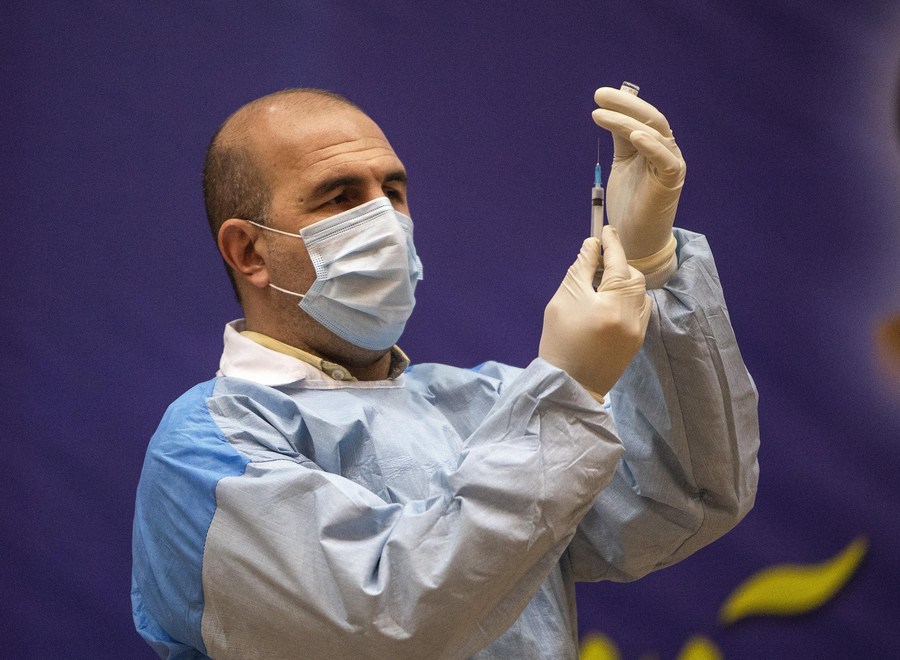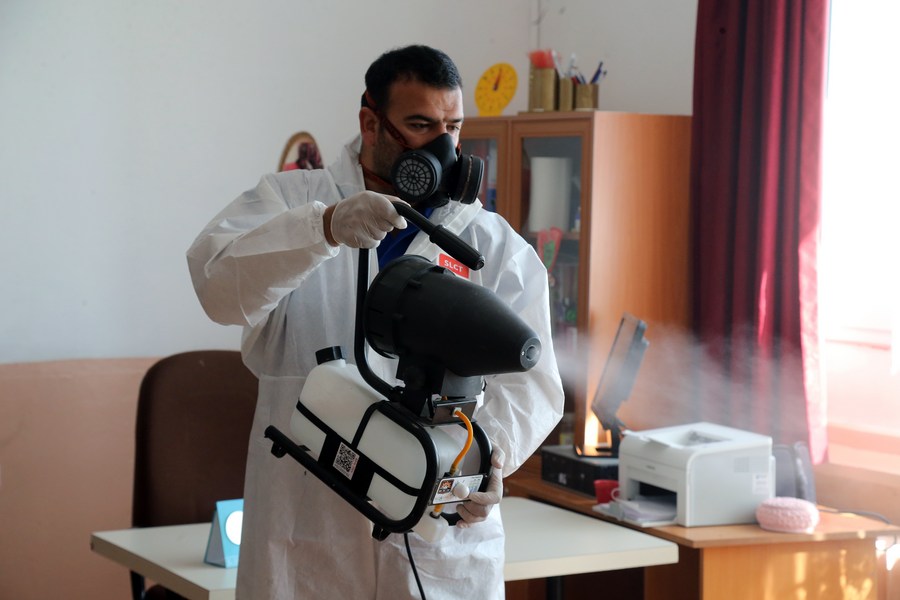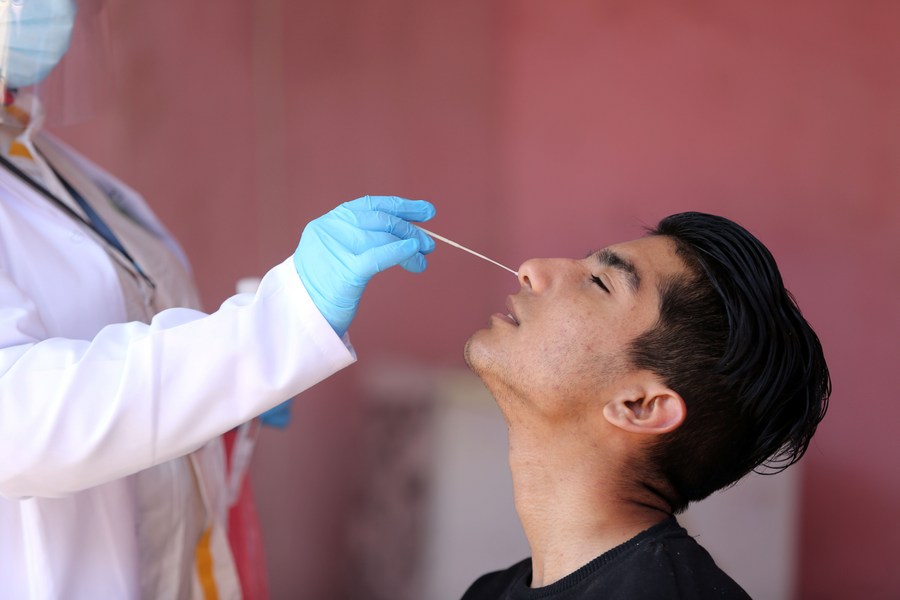
A healthcare worker prepares to give injection of the COVID-19 vaccine at a hospital in Tehran, Iran, on Feb. 9, 2021. (Xinhua/Ahmad Halabisaz)
-- Iran plans to produce COVID-19 vaccine by spring;
-- Turkey adopts drastic anti-virus measures in provinces;
-- Iraq expects to receive 1st batch of vaccines in days;
-- Half of Israelis vaccinated against coronavirus.
CAIRO, Feb. 26 (Xinhua) -- The Iranian health minister said on Friday that Iran will turn into a major COVID-19 vaccine producer by spring, starting with vaccinating the vulnerable groups. Meanwhile, Turkey introduced a series of drastic measures in several provinces where the number of the COVID-19 daily cases are significantly on the rise.
"With the continual efforts of the Iranian youth, we will become one of the largest (COVID-19) vaccine hubs in the world in the next spring," said Iranian Health Minister Saeed Namaki.
"We will hopefully be able to control the situation by utmost observance of health guidelines," he added.
Iran reported 8,103 new COVID-19 cases on Friday, raising the total nationwide infections to 1,615,184.
The pandemic has so far claimed 59,899 lives in Iran, up by 69 in the past 24 hours, said Sima Sadat Lari, spokeswoman for Iranian Ministry of Health and Medical Education, during her daily briefing.
On Feb. 9, Iran started nationwide vaccination campaign against COVID-19 using Russia's Sputnik V jabs.

A cleaner wearing a mask disinfects a school in Ankara, Turkey on Feb. 26, 2021. (Xinhua/Mustafa Kaya)
In Turkey, local authorities in the northwestern province of Sakarya banned all activities of sports facilities for 15 days starting March 1, the CNN Turk broadcaster reported.
In Bodrum, one of the most popular international tourist destinations in the southwestern Turkish province of Mugla, picnic activities were forbidden in beaches, parks, and other recreation areas.
The Black Sea provinces of Rize and Tokat as well as a district in the northwestern province of Edirne also imposed similar restrictions to contain the spread of the coronavirus.
Turkey on Friday confirmed 9,205 new COVID-19 cases, including 649 symptomatic ones, raising the total number in the country to 2,683,971.
The death toll from the virus in Turkey, arguably the hardest hit country in the Middle East, rose by 74 to 28,432, while the total number of recoveries climbed to 2,556,785 after 10,282 more recovered in the last 24 hours, according to the country's health ministry.
The rate of pneumonia in COVID-19 patients in Turkey stands at 4.2 percent and the number of seriously ill patients is 1,195, said the ministry.
Turkey started mass COVID-19 vaccination on Jan. 14 after the authorities approved the emergency use of China's CoronaVac vaccine.
Iraq has so far confirmed 688,698 coronavirus cases in the country, with 4,336 new ones added on Friday.
It also reported 14 new deaths, raising the death toll from the infectious virus to 13,365, while the total recoveries in Iraq climbed by 2,460 to 630,178.

A healthcare worker collects a swab sample from a man for COVID-19 test in Baghdad, Iraq, Jan. 31, 2021. (Xinhua photo)
Haider Majeed, spokesman of the General Secretariat for the Council of Ministers, told the official Iraqi News Agency that the Ministry of Health assigned 52 hospitals and 506 health centers across the country to vaccinate the citizens.
The Iraqi health authorities expect to receive the first batch of coronavirus vaccines in a few days, as the Iraqi National Board for Selection of Drugs has approved the emergency use of China's Sinopharm and Britain's AstraZeneca vaccines to contain the spread of COVID-19 in the country.
Israel's Ministry of Health reported 2,738 new COVID-19 cases on Friday, raising the tally in the country to 769,971.
The death toll from the COVID-19 in Israel reached 5,694 after nine new fatalities were added, while the number of patients in serious condition decreased from 751 to 738.
The number of people vaccinated against COVID-19 in Israel has reached 4,649,709, or half of its total population, since the vaccination campaign began on Dec. 20, 2020, said the Israeli Ministry of Health.
In Palestine, 660 new cases and 10 deaths were reported on Tuesday, raising the total number of infections in the West Bank, the Gaza Strip and East Jerusalem to 176,076 and the death toll to 1,977.
As the first among the Gulf countries to report COVID-19 cases, the United Arab Emirates (UAE) on Friday confirmed 3,498 new COVID-19 cases, bringing the total cases in the country to 385,160.
It also reported 2,478 new recoveries and 16 deaths, taking the tally of recoveries in the UAE to 377,537 and the death toll to 805.

An Israeli woman gets vaccinated against the COVID-19 at a temporary facility set up by the Israeli Magen David Adom national emergency service in Tel Aviv, Israel, on Feb. 20, 2021. (Tomer Neuberg/JINI via Xinhua)
Morocco reported 480 new COVID-19 cases and 10 deaths on Friday, raising the tally of infections to 482,994 and the death toll to 8,608 in the North African country.
The North African country has launched a nationwide vaccination campaign on Jan. 28 after the arrival of the first shipment of the Chinese vaccine.
In Kuwait, 1,022 new COVID-19 cases and five more deaths were reported on Friday, raising the tally of infections to 189,046 and the death toll to 1,072.
The Kuwaiti government decided on Monday to close land and sea borders from Feb. 24 until March 20 with the exception of shipping operations.
Lebanon on Friday registered 3,373 new COVID-19 cases, raising the total number of infections to 369,675. Meanwhile, the death toll from the virus went up by 50 to 4,610.
Firas Abiad, director of Rafic Hariri University Hospital, warned on Friday of a possible new wave of the virus despite the rollout of the vaccine in the country as "the high COVID-19 numbers in the last few days are an ominous sign."
China has decided to donate COVID-19 vaccines to Tunisia, the Chinese Embassy in Tunisia announced in a statement posted on its Facebook account on Thursday night.
The Yemeni Health Ministry announced on Friday that it had approved the emergency use of the British AstraZeneca COVID-19 vaccine in the country's war-torn provinces, saying "the first round of vaccination campaign is expected to be launched within a month."
In Qatar and Saudi Arabia, the number of COVID-19 cases on Friday rose by 469 and 346 respectively to 162,737 and 376,723. ■




